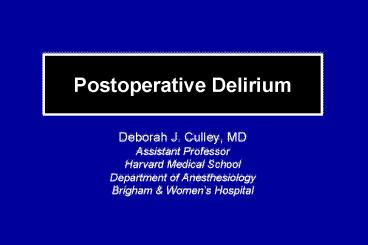Postoperative Delirium - PowerPoint PPT Presentation
1 / 15
Title:
Postoperative Delirium
Description:
Disturbance of consciousness with reduced ability to focus, ... Type of anesthesia (regional vs. general) Marcantonio, et al. Am J Med 1998; 105: 380 - 4 ... – PowerPoint PPT presentation
Number of Views:1896
Avg rating:3.0/5.0
Title: Postoperative Delirium
1
Postoperative Delirium
- Deborah J. Culley, MD
- Assistant Professor
- Harvard Medical School
- Department of Anesthesiology
- Brigham Womens Hospital
2
Clinical Features of Delirium
- Disturbance of consciousness with reduced ability
to focus, sustain, or shift attention - Change in cognition (memory deficit,
disorientation, language disturbance) or a
perceptual disturbance - Disturbance develops over short period and tends
to fluctuate during the day - disturbance is caused by the direct physiologic
consequences of a general medical condition or
during substance intoxication
APA DSM-IV criteria
3
Diagnosing Delirium The Confusion Assessment
Method (CAM)
1. Acute onset fluctuating course 2.
Inattention 3. Disorganized thinking 4. Altered
level of consciousness
Inouye SK, et al. Ann Int Med 113 941, 1990
4
DeliriumA very common perioperative complication
In Hospital - 10 - 15 Perioperatively 5 - 73
Critically Ill / ICU gt 60
Williams-Russo et.al., JAGS, 92 Dyer et. al.,
Arch Int Med, 95 Inouye et. al. NEJM, 99
06 Girard TD, et al. Crit Care Med 2008
5
Delirium Marker or Cause of Poor Prognosis?
- Long term outcome poor
- 36 institutionalized 26 dead at 6 months
(Cole, 1998) - Delirium may be predictor of subsequent dementia
/ cognitive decline (Rockwood K, 1999 Ancelin
ML, 2001 Bickel H, 2008)
6
Delirium Costly
- Total cost estimates attributable to delirium
ranged from 16,303 to 64,421 per patient,
implying that the national burden of delirium on
the health care system ranges from - 38 - 152 billion each year.
Leslie DL et al. Arch Int Med 168 27 - 32, 2008
7
Predicting Delirium After Noncardiac Surgery
Age gt 70 Cognitive Impairment Executive
Function, Hx Delirium Depressive
Symptoms Multiple Medical Co-Morbidities Low
Physical Function Visual and Hearing Impairment
Electrolyte and Glucose Abnormalities Major
Surgical Procedures Apolipoprotein E e4 allele
?
?
?
Marcantonio ER, et al. JAMA,1994, Greene NH, et
al., Anesthesiology 2009 Smith PJ, et al.,
Anesthesiology 2009, Leung JM, Anesthesiology
2007, Dasgupta M, et al., J Am Geriatr Soc 2006
8
Postoperative Delirium - Intraoperative Risk
Factors
- Large blood loss (OR 1.6 / 1000 ml)
- Blood transfusion
- Markedly abnormal serum chemistries
- Glucose lt 60 or gt 300 mg/dL
- Sodium lt 130 or gt 150 mEq/L
- Potassium lt 3.0 or gt 6.0 mEq/L
Marcantonio ER, et al. Am J Med, 1998
9
Precipitating Factors for Delirium in
Hospitalized Elderly
?
?
Inouye SK, et al. JAMA 1996
10
Delirium Not Associated With
Type of anesthesia (regional vs. general)
Marcantonio, et al. Am J Med 1998 105 380 - 4
Williams-Russo, et al. JAGS 1992 40 759 -
67 Rassmussen LS, et al. Acata Anaesth Scand
2003 47 260 - 6 Vaurio LE, et al. Anesth Analg
2006 102 1267 - 73
11
Depth SedationHypnosis Risk Delirium
Sieber FE, et al. ASA 2007, A472
12
Role of pain its management in delirium
- Moderate severe preop pain increase delirium
risk (2-3 fold) - Postoperative pain increases risk
- No difference between postop PCA neuraxial
analgesia - Oral opioids assoc with decreased risk compared
to IV opioids via PCA
?
Wang Y, et al., Am J Geriatr Psychiatry
2007 Vaurio LE, et al., Anesth Analg 2006 Fong
HK, et al., Anesth Analg 2006
13
Risk Reduction Strategies
- Preoperative Geriatric Consultation
- Geriatric Care Unit
- Pharmacotherapy
Rubin FH, J Am Geriatr Soc. 2006
Jun54(6)969-74. Marcantonio ER, J Am Geriatr
Soc. 2001 May49(5)516-22 Tabet N, Int J Geriatr
Psychiatry. 2009 Feb 18
14
Treatment of Delirium
- Treat underlying medical conditions
- ?? Haloperidol or Chlorpromazine ??
- (protection of patient and staff)
Lonergan E, Cochrane Database Syst Rev. 2007
15
Postoperative Delirium
- Medical Emergency
- Common
- Expensive
- May be first sign of other problems
- Associated with adverse outcomes mortality
- Vigilant care may reduce incidence
Our patient is at high risk!































